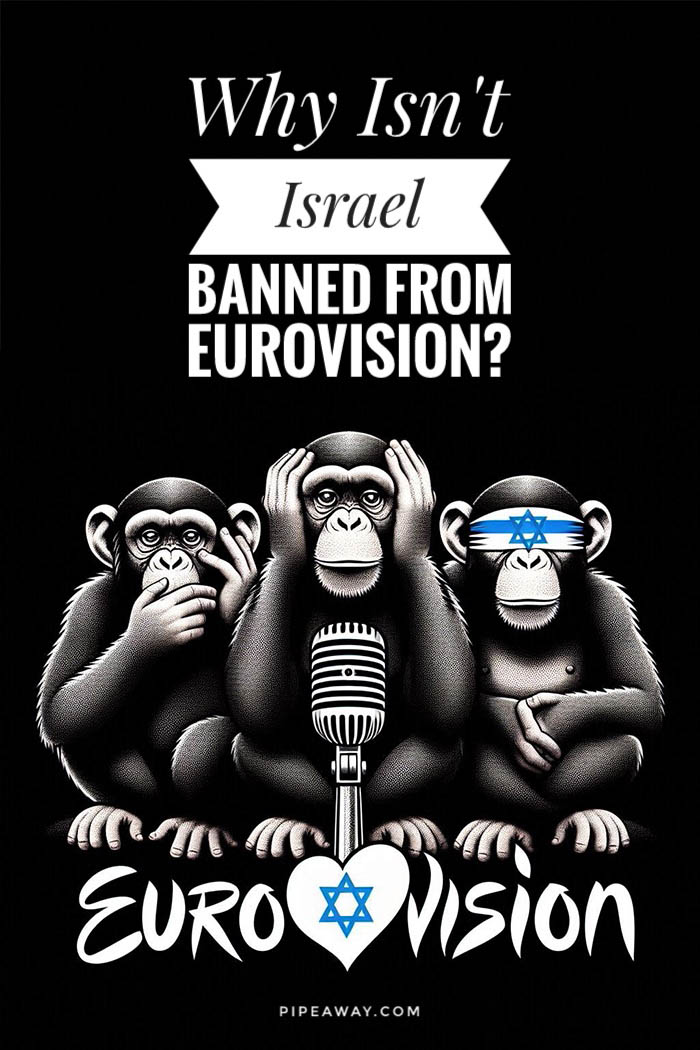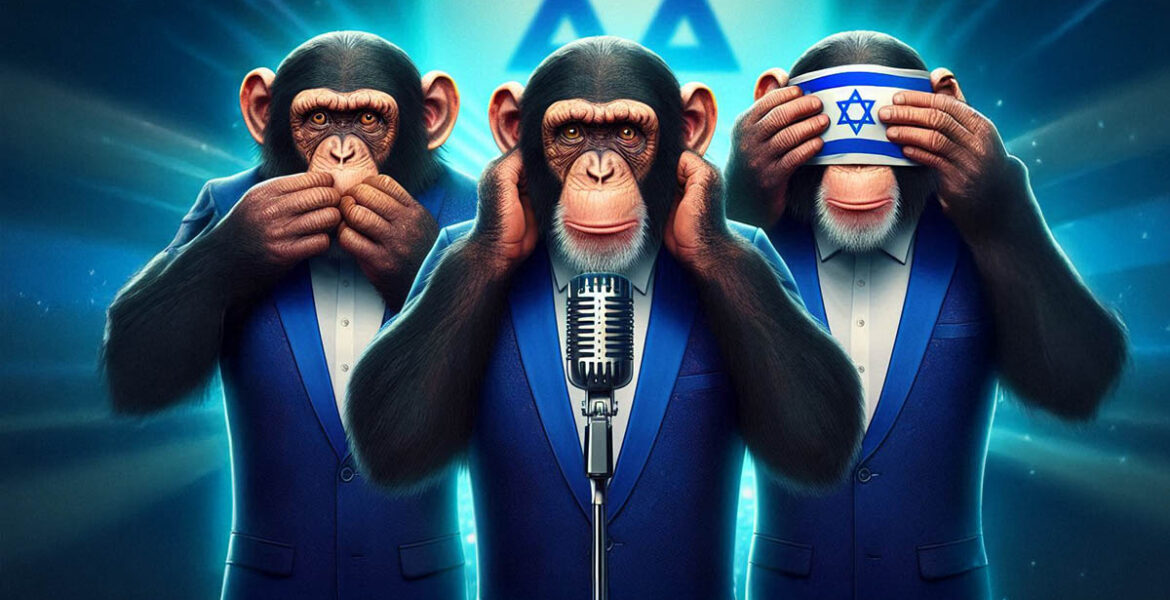In May 2025, the Eurovision Song Contest is coming to Basel, the cultural crown jewel of Switzerland – the birthplace of the longest-running televised music competition (launched in Lugano, 1956), and the headquarters of its organizer, the European Broadcasting Union (in Geneva). In the highly turbulent world, the United by Music festival is returning home, to the country that adopted neutrality as its foreign policy. But not for the first time, Eurovision Israel boycott calls are loud, showing that the controversy can’t just be put to sleep by silence. It’s hard to sing with Gaza genocide screams in the background, so the voices are growing stronger again: Why is Israel still a part of Eurovision?
Letters from politicians, petitions from artists and general public, and even broadcasters’ calls for Israel to be disqualified from Eurovision, and still crickets
Just last week, three members of the European Parliament – Alex Agius Saliba (Malta), Matjaž Nemec and Irena Joveva (Slovenia) – sent a strongly worded letter calling for Israel’s Eurovision entry to be disqualified.
“In light of over a year and a half of Israeli atrocities in Gaza and the West Bank, persistent human rights violations, and severe breaches of international law – including continued war crimes without accountability – we believe the EBU must act to uphold its mission and values, while also protecting the integrity of the competition”, MEPs stated.
The next day, RTVE, Spain’s public broadcaster and one of Eurovision’s top five funders, communicated concerns of Spanish civil society for the situation in Gaza. In polite Euro-speak, they asked the EBU to open “a space for reflection”, an internal debate on the participation of Israel in ESC.
These are just the latest voices questioning Israel’s participation in Eurovision.

Last month, over 10,000 people and 500 culture workers in Finland signed a petition urging national broadcaster YLE to push for Israel’s Eurovision ban due to the war in Gaza. A year ago, 1,300 Finnish musicians signed a similar call, while a Swedish petition advocating for Israel’s ban listed 1,000 artists. In Iceland, 500 musicians petitioned to pull out altogether rather than share a stage with Israel, while 450 queer artists demanded the same from Olly Alexander, then representative of Great Britain.
The first country to demand the EBU’s reaction without gloves was Slovenia. In December, RTV SLO officially requested Israel’s disqualification from Eurovision 2025. EBU’s response? According to available information – crickets.
After all the protests, petitions, and public pressure, why isn’t Israel banned from Eurovision?
Big Five, Small Talk
While it could silently archive the request of a small country like Slovenia in a drawer, EBU couldn’t ignore Spain, one of the Big Five countries, which, due to their financial contribution to the event, directly qualify for the ESC final. The very same day RTVE called for a forum for debate, EBU practically shut it down, with a statement of two sentences.
“We welcome RTVE confirming their commitment to the Eurovision Song Contest and appreciate there are concerns and deeply held views around the current conflict in the Middle East. All Members of the EBU are eligible to compete in the Eurovision Song Contest and we remain in constant contact with those participating this year, including RTVE, on all aspects of the Contest”, the corporate shrug said.
In other words (if these 61 were not clear enough), EBU dusted off its go-to line that Eurovision is a competition between member broadcasters, not countries. So as long as Israel broadcaster KAN is a member, EBU doesn’t plan to question their participation. If Spain tried to ring the alarm, EBU just put it on snooze.
Will it do anything to facilitate the debate? EBU plans to “remain in constant contact”, which can be translated only as: no changes.
Eurovision dilemma: Israel vs. Russia
When Russia invaded Ukraine on February 24, 2022, the EBU responded with a similar speed. By the next day, Russia was booted from Eurovision. No one was saying that Russian broadcasters RTR, Channel One and RDO had the eligibility of EBU members.
Even if the three Russian representatives withdrew from the membership soon after the Eurovision ban, no broadcaster sins were mentioned in the EBU statement. One could almost conclude that the Eurovision Song Contest was a competition of countries after all.
“The decision reflects concern that, in light of the unprecedented crisis in Ukraine, the inclusion of a Russian entry in this year’s Contest would bring the competition into disrepute”, EBU explained.
If the Russian invasion of Ukraine was an “unprecedented crisis”, that very decision established a precedent: political context can disqualify a country. Sorry, broadcaster. Sorry… country? Wait, which is it?

(Not) Dealing with Israel left boycott supporters confused. They posed a valid question on EBU’s consistency and double standards: Why is Russia banned from Eurovision, but not Israel? Is Eurovision’s moral compass spinning to the beat of strategic alliances?
EBU never explained why it treats Israel’s challenges to Eurovision’s reputation differently from Russia’s. The only difference was expressed in wording: the situation in Ukraine was named a ‘crisis’, the catastrophe in Palestine – a ‘conflict’. But surely that’s not enough to say that the calls for boycotting Israel are pointless.
Another possibly important aspect in the Eurovision why-Israel-not-Russia dilemma is that, in 2022, countries like Finland and Estonia were very vocal in threatening to leave the competition should Russia stay. Could it be that Eurovision banned Russia because other countries used their participation as real leverage?
In the meantime, the concrete vocabulary of action was replaced with expressions of concern and expressions of appreciation of concern, a practically meaningless diplomatic lingo that cannot yield results beyond just sending a general message that not all of Europe is indifferent.
Why are there boycott calls against Israel?
The calls to boycott Israel’s participation in Eurovision gained momentum after Israel’s military response to the Hamas attacks on October 7, 2023. Israel’s large-scale offensive led to a staggering number of civilian casualties, widespread destruction of infrastructure, and a humanitarian disaster in Gaza.
Hamas-led surprise attacks in southern Israel took 1,200 lives. Israel’s retaliation didn’t stop at self-defense; the death toll in the Gaza Strip has surpassed 50,000, with the majority of victims being children and women.
By erasing entire families, bombing hospitals, schools, and even UN humanitarian shelters, using starvation as a weapon, the Israeli military offensive has all the characteristics of a war crime and crime against humanity.
While Eurovision insists on being an apolitical celebration of music and unity, critics argue that in the face of widespread suffering and destruction, participation in Eurovision is not a neutral act, but a political one. And silence then equals complicity.

On top of that, Israel’s entries are now regularly coming with political undertones in their lyrics. The days of Nadav’s “Golden Boy” (2015) or Netta’s “Toy” (2018) are long gone.
Eden Golan’s 2024 entry “Hurricane” was originally titled “October Rain” – widely interpreted as a direct reference to the Hamas attacks. It took the intervention of Israel’s President Isaac Herzog for KAN to accept the lyrics change as a strategic loss. For many critics, this makeover added fuel to the fire: not only is Israel being allowed to compete, but it’s also allegedly bending the rules to send a politically charged message, just cloaked well enough to pass.
Israel’s 2025 entry is “New Day Will Rise”, performed by Yuval Raphael, one of the 11 survivors of the Supernova Music Festival massacre in Re’im, the same October 7 attack. A harrowing destiny of surviving under dead bodies in a bomb shelter amplifies an angelic voice singing of hope.
While EBU prohibits politically charged messaging in Eurovision songs, Israel seems to have found the recipe to deliver a political narrative while abiding by the rules.
The boycott calls often recognize the practice as artwashing – using a high-profile cultural event to gloss over human rights violations, and to improve a country’s international image. LGBTQ+ organizations also called out Israel’s pinkwashing – exploiting the idea of a queer-friendly oasis in the Middle East as a rainbow-colored PR shield to distract from the oppression of Palestinians.
All in all, the Eurovision boycott calls are about visibility, accountability, and whether international cultural stages can exist in a vacuum while humanitarian disasters unfold just offstage.
Sound of silence
The Eurovision-Israel boycott debate reopens an old question: Can Eurovision remain apolitical in a deeply political world? EBU seems to believe silencing is an adequate method to tackle disputing voices.
The mute-mode toolbook includes:
Political statements ban
ESC’s Duty of Care guidebook instructs delegations to refrain from expressing political opinions during participation as it “protects the Contest’s integrity, helps avoid controversy, and ensures that the focus remains on the music”. Political statements could “harm the ESC’s reputation, create diplomatic tensions, and place unnecessary pressure on artists”.
Check out the controversial questions/answers on ESC press conferences in 2019 and 2024!
Flag control
The ESC’s updated Code of Conduct (as of December) specifies that only “official flags representing participating countries are welcome”. This means that last year’s controversial ban on the EU flag in the arena seems to remain. The Code of Conduct doesn’t mention flags representing LGBTQ+ communities either.
Speaking of Israel, it was exactly in Tel Aviv, during the 2019 Eurovision, when flags sparked controversy. Madonna’s dancers wore Israeli and Palestinian flags on their backs without approval of the organisers, and Iceland’s Hatari raised Palestinian flags during the televoting, earning a €5,000 fine and a permanent place in ESC protest history.
See the Icelandic punk band’s flag protest that didn’t make a cut in the official DVD recording of Eurovision!
Live broadcast editing
Controlling the contracted artists is one thing. Controlling thousands of fired-up fans? That’s trickier. Smuggled protest signs and banned flags can slip past security. But there’s a Plan B for such activism being seen on TV: live camera cuts.
Audio changes are, however, a sophisticated manipulation. When Polina Gagarina performed for Russia in Vienna (2015) and Eden Golan sang for Israel in Malmö (2024), both were met with intense arena booing. But the folks watching from their couches at home, thanks to anti-booing technology, heard… fake applause.
This is how Eden Golan’s act really sounded like in Malmö arena!
Cracking the Code of Conduct
To prevent artists and other stakeholders from disrespectful engagement, the Eurovision’s new Code of Conduct specifies: “Disruptive behaviour is to be avoided at all times, particularly during live performances and ongoing production activities, to ensure a positive and enjoyable experience for all participants and the audience.”
The appendix of the code especially addresses interruption of events as “yelling, loud critiques, or distracting actions that interfere with rehearsals, performances, or other official ESC functions”.
Would Bambie Thug’s post-Eurovision interview with “Beep the EU” message go against the new Code of Conduct?
Eurovision Israel Boycott – Conclusion
As soon as someone questions Israel’s participation in Eurovision, defenders – official and non-official – quickly unleash a familiar arsenal of accusations: calling proposed boycotts “anti-Semitic” or “a reward for Hamas terrorism”.
“Remember, we are the ones who went through genocide”, sings a mock Eden Golan in Eretz Nehederet, a comedy show on Keshet 12 that kidnaps Nemo, Bambie Thug, Joost Klein, and Marina Satti, demanding an apology to the Israeli representative. After the “parody” trivializes the Holocaust, the real Eden Golan blesses the show with her presence, offering forgiveness and declaring, “music brings us together”.
Maybe it does. But insisting on harmony while war dominates the headlines only deepens the dissonance.
Pro-Palestinian demonstrators marched in Basel despite the public rally ban. Will Malmö protests have a May reprise in Switzerland?
“The lyrics this year can’t be construed as anything but political, so I don’t even know how they allowed it to compete”, says Juror B in Wiwiblogs review of “New Day Will Rise”. The only Eurovision review on this popular website that had to anonymize the jurors (all other songs are reviewed under authors’ names) shows how real the fear of a backlash has become in a continent that otherwise prides itself on freedom of speech.
EBU continues to believe that banning all political expression is the safest path forward. But in democracies, silence has never been a well-accepted solution. Despite wishful thinking, Eurovision’s “unifying spirit” sounds increasingly hollow when it embraces countries accused of war crimes while silencing those who speak out.
In January, despite bans on public rallies, over 15,000 pro-Palestinian demonstrators took to the streets of Basel to criticize Switzerland’s declared neutrality as complicity in genocide. Could Malmö protests have a May reprise in the homeland of Eurovision?
By trying to avoid controversy, the EBU may think it’s keeping the peace. But when it comes to Gaza, silence is not neutral – it’s political. As fans and artists push for Eurovision to reflect the realities of the world, the question becomes: Can a global stage for culture afford to mute the very voices it claims to amplify?
What is your opinion on Israel’s participation in Eurovision?
Leave your comment below and pin the article for later!



